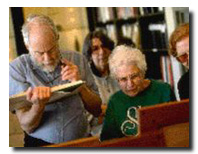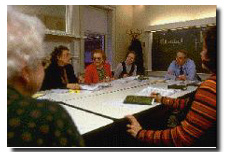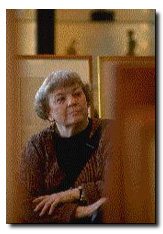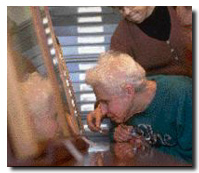Main Menu · Search · Current Issue · Contact · Archives · Centennial · Letters to the Editor · FAQs

| An Academy for the Third Age | Sandrine's Bistro | |
| Tastes of the Town | The Harvard Scene | |
| The Sports Scene | ||
 | |
| |
On February 11, 1977, 92 men and women in their early sixties and seventies gathered in the library of the Harvard Faculty Club to register as charter members of the Harvard Institute for Learning in Retirement (ILR). Thus began an experiment that will celebrate its twentieth anniversary at the end of April. What has emerged in the program's first two decades is a fully peer-led adventure in unadulterated learning for the pure sake of learning, a venture that allows participants, after they have graduated from their careers, to concentrate on intellectual enrichment throughout the third age of their lives.
More than a century ago--in two articles on "The New Education" published in the Atlantic Monthly in 1868, and shortly afterward in his inaugural address--the youthful and forward-looking Charles W. Eliot, president of Harvard from 1869 to 1909, laid out his vision of higher education. Among its dominant ideas should be "...the enthusiastic study of subjects for the love of them without any ulterior object...." Concerning the nature of learning, he said, "A university is the last place in the world for a dictator. Learning is always republican. It has idols, but not masters." And with regard to the consumers of higher education, he suggested, "It has been too much the custom to think of education as an affair of youth...it really should be the work of the whole of life." Even Eliot with his extraordinary vision could perhaps not have foreseen the emergence within the University of a college of career graduates that would carry these ideas forward in novel ways and give national definition to the concept of learning in later life.
In creating the Institute for Learning in Retirement, Harvard was responding to the challenges and opportunities presented by the aging of the American population. As the baby boomers grow older, the percentage of the citizenry who have outlived middle age is accelerating at a dramatic pace. In 1950 only one in 12 Americans was 65 or older. By the 1976 bicentennial the ratio was one in 10. In 2050 the projected ratio will be a staggering one in five. The net increase in the number of Americans over 65 is now 1,400 per day--more than one-half million additional people per year joining the ranks of the third age. Even these figures may prove conservative, given the accelerating advances in medicine and research on the biology of aging. To some it may border on science fiction, but Michael R. Rose, a genetics researcher at the University of California at Irvine, has bred fruit flies that live more than twice as long as normal fruit flies and maintain their vigor proportionately into old age. In the past several years, a promising new field of research that analyzes aging at the cellular level has begun to decipher the life-timing role potentially played by DNA strips at the ends of chromosomes. In a New Yorker article entitled "The New Age of Man," Malcolm Gladwell reports that these researchers, and a future anti-aging industry that will exploit such theoretical work, fully expect in time to increase the human life span by 20, 50, perhaps even 100 years.
For this brave new old world, Ellen Langer, professor of psychology and member of the Harvard medical faculty's division on aging, offers an encouraging perspective on mental function during life's later years. In her study Mindfulness, she explores the negative
 Focus on art: "Ingres" coordinator Reg McKeen '59, M.A.T. '62, and Frances Quint '47. |
The ILR philosophy of education keeps faith with President Eliot's vision of a dictator-free, "republican" model of learning, pursued for the pure sake of learning and continued for a lifetime. The curriculum is not imposed by the academic establishment from the top down, but rather formulated by the member-consumers from the bottom up. Proposed study-group topics must survive the realities of the learning marketplace--the actual needs and interests of the ILR membership. Members form a study group around one or more volunteer "coordinators," reminiscent of the historic European concept of the privat-docent, the difference being that the group is viewed as a joint venture, and the coordinators expect to learn as much as the other members. The actual curriculum in any given term has a surprising balance of topics; it looks rather like liberal-arts electives from the third and fourth college years and graduate studies. Many topics are one-time offerings, but some continue for years. The record is held by the creative-writing group that Betty Hodges '31 has offered every term for the last 20 years. At age 88 she has recently acquired a computer and modem and is eager to explore cyberspace. "My only regret about growing old," she says, "is that I will miss out on all the new things emerging."
The spring 1997 curriculum presents a variety of study-group topics, including languages, literature, history, philosophy, politics, economics, music appreciation, and science, along with such practical subjects as public speaking and the use of computers for writing, research, and communication. Readings range from Aeschylus's Agamemnon to today's newspaper. Study-group coordinator Charles Gager, for example, brings his interests and experience as an engineer in defense electronics to "Spying in America," which takes a critical look at the history and evolution of American intelligence operations. Robert Gallant, Ed '47, a retired telephone-company executive and humorist on local cable TV programs, says he "has been guiding ILR study groups through the labyrinths of humor since 1987." This spring he has pulled his group up to "The Algonquin Round Table."
While some members have explored a number of different topics over many semesters, others have developed a commanding knowledge of certain subjects by focusing more narrowly. That the program allows and even encourages this is one of the unique aspects of the third-age learning experience. It dispels the myth that expertise in a subject or discipline comes primarily during late youth and middle age. A good example of this alternative possibility is Margaretta Thuma, who has studied the European Community intensely. She joined the ILR after her husband died and remembers being "terrified on her first day in the program." Now, she admits with modesty, she has in fact become something of an expert on the European Union. Thuma's current group, "Turkey and Her Neighbors," is examining the critical issues that surround contemporary Turkey, its role in NATO, and the issue of its admission to the European Union.
 Charles Cook '48 leads a discussion group in one of the Institute's new meeting rooms at 51 Brattle Street. The topic of the day was IRA accounts. |
Other members use the ILR program to explore topics that always interested them but were put on the back shelf by busy careers and the demands of family life. Says Ray Revers, "I thought when you retired, the next stop was heaven, but I just wasn't ready for it." As a participant in a group studying "The Hapsburg Empire," his interest in music was rekindled. This led him to offer his own study group on "Vienna and Its Music." Like many others, he has experienced the phenomenon now being studied by psychologists and neurologists--the remarkably beneficial effect on brain function of focusing vigorously on a new subject or activity in later life. "My dad," says Revers, "was older at 50 than I am now." Such positive effects often result in the enthusiastic commitment of an unusual amount of time and energy to the program. Milton Paisner '36, former ILR Council president and leader of the "English Renaissance Drama" group, says that the institute consumes as much as 75 percent of his time. Even his barber, who is half his age, usually greets him with "Hi, Milt. How's school?"

Contrary to the stereotypes of older people confronting electronic gadgets, Harvard's ILR members are beginning to move into cyberspace. Peter Spellman, who built a manufacturing business, sold it to become a sculptor, and then at age 55 took up computer programming, leads computer study groups. He says that 10 percent of ILR members are already using e-mail, and through computer study groups they and others are discovering the world available through electronic portals. More access will soon be possible through the Harvard Extension computer lab. A hint of future possibilities can be seen in an experiment at Northwestern University's ILR, where participant Ralph Otwell, using the Internet, developed an on-line "virtual" study group, bringing people together electronically from different locations to study how the media handled the 1996 election campaign.
Harvard's ILR might be seen as a vehicle for the conceptual revolution encouraged by Ellen Langer and also as an experimental education laboratory with 20 years' worth of accumulated experience. Admitting to its membership retired and semiretired people who are seriously committed to learning and willing to participate energetically with fellow members in study groups on a variety of self-determined topics, the institute has increased steadily both in size and in the vigor of its intellectual activity. From its 1977 beginning with 92 members and 13 study groups it had grown--without soliciting applications--to 521 members and 53 study groups by last fall. From its sparse original digs in Harvard Yard, in the basements of Harvard Hall and Lehman Hall, the institute moved in 1991 into splendid new quarters at 51 Brattle Street, the step up arranged by Dean of Continuing Education Michael Shinagel. The new facilities include administrative offices, classrooms, a dining area, and an elegant library/reading room.
In conjunction with this move to a new home, the institute's members, led by the late Ruben Fogel '28 and Robert (Bobby) Cobb Jr. '48, mounted an ILR endowment campaign to secure the program's independence and continuity for future generations, and to provide scholarships for members, library materials, teaching aids, and special lectures. Leonie Gordon, the current program administrator, reports that the campaign has reached its $1 million goal in time for the twentieth-anniversary celebrations in April. The successful conclusion of this fund drive is a tangible indication of how meaningful the program has been to its members. Niel Pendleton, a charter member who in the early years encouraged the members to develop just such an endowment fund, says, "Joining the ILR was one of the three most significant moments in my intellectual life."
 "To sit down and discuss at length the works in front of you was an experience I never had when I was younger," says Kate Chaiban. |
Bobby Cobb has also established a memorial lectureship at the ILR in honor of his father, Robert C. Cobb '15, who founded a family-owned poultry-breeding business and ran it until his retirement in 1963 at age 72, at which time he returned to Harvard to audit courses informally. Professor of education Howard Gardner delivered the first Cobb Lecture last September, on the topic "Creativity across the Life Span."
Since joining the program in 1977, Bobby Cobb has led ILR study groups on contemporary history, India, Southern Africa, Soviet planned economics, and the history of Boston. He jokes that he was at Harvard College for only four years, but has been at the ILR for almost 20, which has made him five times smarter.
The program has not, however, been without its critics. In the early years a Harvard administrator once caustically described the ILR as "the little old ladies from Belmont." Later, noticing a group of men and women dining together at the Faculty Club, he asked a colleague who the distinguished-looking people were. The colleague, knowing the group was from the ILR and included a former state department officer, the general counsel and vice president of a major Boston bank, and a former faculty member from Harvard's Graduate School of Education, answered, "Those are your little old ladies from Belmont."
Such problems as the program does have are largely an index of its success. For the first time, planning for the current spring term drew more acceptable study-group proposals than could be implemented. In addition, the program has now reached what most agree should be its maximum size, and each term is able to admit only 30 to 50 percent of the qualified new applicants. "Admission," one member says, "is the hottest intellectual ticket in town."
The growth of harvard's ilr is reflected in the emergence of many similar programs at colleges and universities throughout this country as well as abroad. In 1988 the Institute Network, a national association for ILR programs, was formed under the sponsorship of the Elderhostel organization. Its original 25 participating institutions grew to more than 100 by 1992, and by 1996 included more than 200 established programs and 50 in various stages of development. At the current rate of growth, there will be more than 300 ILRs in the United States by the year 2000. A French-based organization, TALIS (Third Age Learning International Studies), encourages program interaction on the international scene.
The Harvard institute, both by example and by outreach, has played a significant role in the development of sister programs. A European relative visiting an ILR member took the idea home and started a program in Sweden. Elizabeth Cless '38 used the institute as a model in developing the Plato Society, UCLA's retirement-learning program. An early article in Harvard Magazine about the ILR (May-June 1985) contributed to the development of a highly successful ILR at Northwestern University's Evanston campus in 1987 and a second program at their Chicago campus in 1990. Stephanie Smith, an ILR charter member, moved to Las Vegas and in 1991 sparked the development of a vigorous new program at the University of Nevada, Las Vegas, with the support of Paul Aizley '57, the university's dean of continuing education. In recent years two Harvard ILR leaders, Nancy Sack and Milton Paisner, have assisted in the development of 15 new ILR programs around the country.
 "I was delighted that the Fogg was so open to us," reports ILR member Frances Quint. |
A speculation about the future in the ILR's tenth-anniversary booklet suggested, "It is not difficult to envision an ILR member continuing in the program for 10, 15, or 20 years!" That 20-year milestone was attained this year by some of the surviving charter members. In the process, something quite new has been added to the concept of "belonging to a college." The experience of bonding with one's peers, so important in the undergraduate experience, is dramatically extended and enriched for ILR members, some of whom have collaborated with their Harvard ILR colleagues for five times as long as an undergraduate spends at Harvard.
Friendships enriched by joint academic adventures over such extended periods have resulted in an intellectual community of genuine caring and interaction that exceeds anything found elsewhere in university life. Such a rich and meaningful association of mature learners with each other and with the mother institution is a new phenomenon in higher education, a significant moment in the unfolding history of the idea of the university. Nancy Sack, former ILR council president, leader of many study groups, and member for 16 years, captured the essence of this experience at the time of the tenth anniversary in a way that resonates with even more meaning today. "The HILR," she said, "has replaced my old companions with a new, larger, and even more enthusiastic group of friends with whom I have explored many fields of knowledge over the past six years, and my future with HILR seems boundless in opportunities for new friendships, new explorations, and new experiences."
What lies ahead in the next 20 years of learning opportunities for citizens of the third age is difficult to discern, but as program members of ILRs throughout the United States and abroad live even longer lives and learn to utilize the technologies that are knitting together what Teilhard de Chardin called the "noosphere," the prospects are truly exciting. Malcolm Gladwell, in his New Yorker article, refers to Robert Heinlein's science-fiction novel Methuselah's Children, where one of the aged characters captures the spirit of long life and learning. The 213-year-old Lazarus Long says to 183-year-old Mary Sperling, "I propose to hang onto this life as long as I can and learn as much as I can.... Mary, my sweet, carpe that old diem!--it's the only game in town."
Main Menu ·
Search · Current Issue · Contact · Archives · Centennial · Letters to the Editor · FAQs
![]()